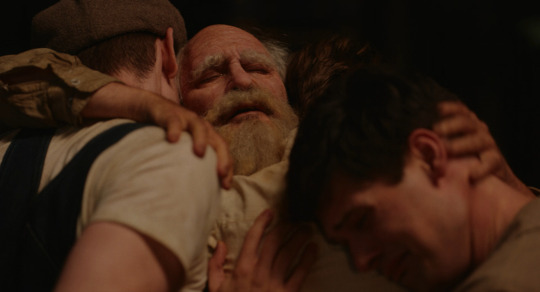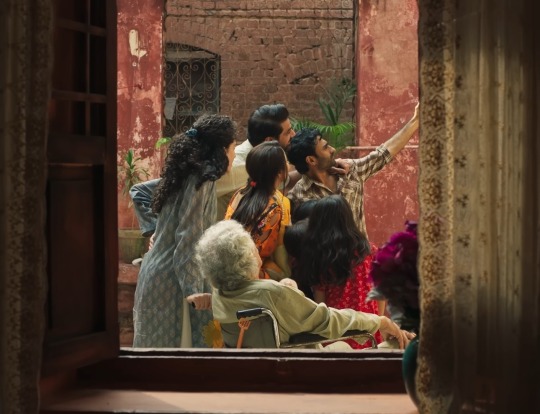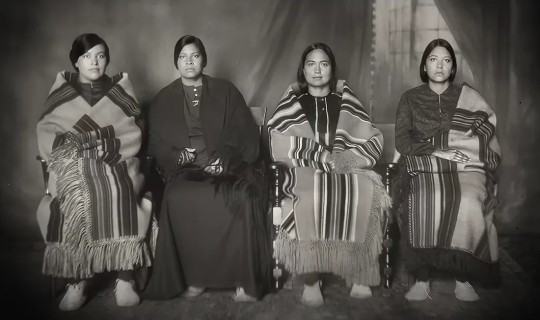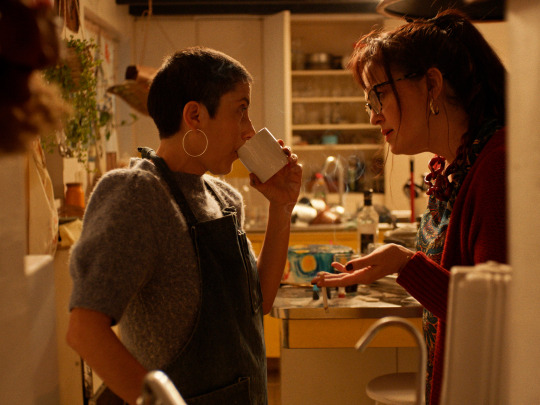#Juliana García
Explore tagged Tumblr posts
Text
Adaptação de 'Cem Anos de Solidão' estreia em dezembro na Netflix
Na última terça-feira (08), a Netflix confirmou que a adaptação de “Cem Anos de Solidão“, obra-prima de Gabriel García Márquez, estreará no dia 11 de dezembro de 2024. A primeira parte da série contará com oito episódios, sendo filmada inteiramente em espanhol na Colômbia, com o apoio da família do autor. Assista ao teaser: Série é um produto da América Latina Dirigida por Laura Mora e Alex…
#Albatros González#Alex García López#América Latina#Camila Brugés#Cem Anos de Solidão#Cesar#Colômbia#Cundinamarca#Diego Ramírez Schrempp#Dynamo#Gabriel García Márquez#José Arcadio Buendía#José Rivera#Juliana Flórez Luna#La Guajira#Laura Mora#Macondo#Magdalena#Natalia Santa#netflix#Prêmio Nobel de Literatura#Tolima#Úrsula Iguarán
0 notes
Text
Moodboard 2 - Versos de Placer
He was still too young to know that the memory of the heart eliminates the bad memories and exalts the good ones and that thanks to this artifice we manage to put up with the past.
Gabriel García Marquez - El Amor en los Tiempos del Cólera

You looked into his eyes and felt a courage you only felt at the sight of a gun, or the sight of your father's eyes. It wasn't usual, it felt very uncomfortable, but rather accept the reality that he only considered it all a passing fever of passion than something that really had consistency.
There was no consistency in that life, nor in the fact that you met, crossed paths and exchanged a single word to each other - because no minimally consistent relationship could come from that reality.
“This can’t be,” You said. “You can’t do this to me, Horacio.”
“You didn't have that right either. Don't believe for a second I didn't think this was all crazy, all... una gran mierda,” His last words came as a whisper, as if he just confessed something serious enough to make him grab all of the circumstances inside his head.
Carrillo sighed.
“Juliana had never confronted me this way, she had never told me what she felt with such certainty. I spent a lot of time blaming her for this, but the truth is, being with me hurts. I'm a ticking time bomb, a static creature that lives by rules that I don't always believe in but that make me who I am. I'm a big bunch of beliefs that don't take me anywhere.”
“... But I did.”
He let the silence linger, a hand passing through his face while he nodded.
“Yeah,” You could see, deep down, that he was on the verge of crying. Carrillo. Crying. Suddenly, he was the that boy, pristine and full of feelings he couldn’t spill out for the sake of being well-behaved, of not building any more problems to his mama.
You never thought you'd witness it - or find sense in a man like that looking so torn apart for so long.
“And I honestly don't know what to make of it all.”
-------------------------------------
Translations:
Haces que yo suba y toque el cielo - You make me go up and touch the sky
Tus manos me conocen bien - Your hands, they know me well
Tus labios con sabor a miel - Your honey-flavored lips
Una grande mierda - a big shit
---
Song - Versos de Placer by maye.
------
No pressure tags:
@cheesybadgers
@thoroughlymodernminutia
@thesandbeneathmytoes
@616wilsons
@nessamc
@padbrookcottage
@the-hinky-panda
@mysoulisasunflower
#horacio carrillo x reader#colonel carrillo x reader#colonel carrillo#horacio carrillo#narcos fanfiction#narcos fic#moodboard#female reader
27 notes
·
View notes
Text
Y no voy a dar nombres.
(Laura Rivera, Andrés Otelo, María Núñez, Carolina Fuentes, Juliana Ortiz, Néstor Jiménez , Vicente Rubio, Johan Peña, Lina Avellaneda, Luis Vélez, Javier Rodríguez, Pablo Herrán, Marta López, Carlos Martínez, Felipe Cifuentes, Clara Penagos, Amanda Villalba, Elisa Sánchez, José Bustos, Nicolás García, Eduardo Acevedo, Gonzalo Suárez, Marina Bolívar, Valeria Hurtado, Susana Pacheco, Rodrigo Velandia, Kevin Osorio, Ruth Urrutia, César Domínguez, Jesús Correa, Santiago Puertas, Alejandro Restrepo, Omar Rivas)
5 notes
·
View notes
Text
ENSEMBLE
Shortlisted: All Dirt Roads Taste of Salt / Earth Mama / May December / Poor Things / War Pony
THE NOMINEES ARE:

BEAU IS AFRAID
Casting by: Julie Breton and Jim Carnahan, Starring: Joaquin Phoenix, Patti LuPone, Amy Ryan, Nathan Lane, Stephen McKinley Henderson, Parker Posey, Zoe-Lister Jones, Kylie Rogers, Richard Kind, Hayley Squires, Denis Ménochet, Armen Nahapetian, Julia Antonelli

JOYLAND
Casting by: Uncredited, Starring: Ali Junejo, Rasti Farooq, Alina Khan, Sarwat Gilani, Salmaan Peerzada, Sohail Sameer, Ramiz Law, Honey Albela, Priya Usman Khan

KILLERS OF THE FLOWER MOON
Casting by: Ellen Lewis, Starring: Leonardo DiCaprio, Robert DeNiro, Lily Gladstone, Jesse Plemons, Tantoo Cardinal, John Lithgow, Brendan Fraser, Cara Jade Myers, JaNae Collins, Jillian Dion, Jason Isbell, William Belleau, Louis Cancelmi, Scott Shepherd, Brent Langdon, Everett Waller, Talee Redcorn, Yancey Red Corn, Tatanka Means, Tommy Schultz, Sturgill Simpson, Ty Mitchell, Gary Basaraba, Charlie Musselwhite, Pat Healy, Steve Witting, Steve Routman, Gene Jones, Jack White, Barry Corbin, Randy Houser, Pete Yorn, Katherine Willis

TRENQUE LAUQUEN
Casting by: Uncredited, Starring: Laura Paredes, Ezequiel Pierri, Rafael Spregelburd, Elisa Carricajo, Verónica Llinás, Juliana Muras, Cecilia Rainero
AND THE CRISTAL GOES TO...

TÓTEM
Casting by: Lila Avilés and Gabriela Cartol, Starring: Naíma Sentíes, Montserrat Marañón, Marisol Gasé, Saori Gurza, Teresita Sánchez, Mateo García Elizondo, Juan Francisco Maldonado, Iazua Larios, Alberto Amador
#2023 Film Awards#Best Ensemble#Tótem#Beau is Afraid#Joyland#Killers of the Flower Moon#Trenque Lauquen
2 notes
·
View notes
Text
June 28, 2023
There are as many ways of translating a literary text as there are translators. The act of carrying a work from one language to another — an art as much as a craft — is anything but mechanical: Translators’ choices are informed by their sensibilities, their emotional landscape, their background.
Literary translators have, however, historically received little recognition. Readers who love books that were rendered in their words often haven’t known their names, since they were not featured on the covers. Within publishing, they were frequently underpaid and given no rights or royalties for their work.
Efforts by translators and by organizations like PEN America, which recently issued a manifesto on literary translation, have brought the field greater visibility, helping to cement the rights of translators and to raise awareness of literary translation as a creative art in its own right.
For a frank discussion of the state of translation, The Times gathered a group of recognized translators:
Samantha Schnee, a translator from Spanish, is the founding editor of Words Without Borders, a digital literary magazine of international literature in English.
Allison Markin Powell, a translator from Japanese, also represents the PEN America Translation Committee on the organization’s board of trustees.
Jeremy Tiang, originally from Singapore, translates from Chinese and is also a novelist and playwright.
Mui Poopoksakul is a Thailand-born lawyer turned literary translator.
Bruna Dantas Lobato, originally from Brazil, is a literary translator from Portuguese and a writer.
This conversation has been edited for concision and clarity.
JULIANA BARBASSA: Over 50 years ago, at the first World of Translation Conference organized by PEN, Isaac Bashevis Singer said: “Translation must become not only an honorable profession, but an art. While I don’t like bloody revolutions, I would love to see a translators’ revolution.” He went on to say of translators that “in all of literature they have been the pariahs,” and to call on the conference to be “the beginning of a rebellion where ink instead of blood will be shed.”
What revolution was he alluding to there, and how much has been accomplished in the years since?
SAMANTHA SCHNEE: There are two ways to answer that question. One, translators' rights is something I think Singer was referring to. But I also think that the translator’s role as a conduit for literature in translation is equally important. To the first issue, I would say a lot of progress has been made in the last 50 years. It was the case that translators routinely were expected to grant copyright in perpetuity for their translations.
Famously, [Gregory] Rabassa’s translation of [Gabriel] García Márquez’s “One Hundred Years of Solitude” was a copyright grant, which really ignores the role of the translator as a creative aspect of the work. No two translators would ever create the same translation from the same text. So I think progress has been made in areas like that.
But I think we have a lot of progress yet to go. For example, the way I see the role of a translator today is very much as a curator. Translators are much more active in the market now: Translators are acting as scouts, in many cases acting as agents. Almost always those roles go unpaid.
I do think translators have a lot more power than certainly 50 years ago, and I would argue even 20 years ago. Translators need to keep fighting to keep those issues at the forefront.
We as an Anglophone culture are mass exporters of all sorts of culture, and we are not importing even a fraction of that. Translators play a really critical role in helping to counteract that.
BRUNA DANTAS LOBATO: In addition to wanting fair pay, wanting our art to be recognized, our names on the covers of books, I also would like to see a push away from this very academic sentiment that comes out of comp lit departments: that it’s some white person from this culture who goes into another culture and imports these artifacts.
There is this sense that it’s a transaction, and it’s one-directional. It feels like a very anthropological impulse from maybe a couple of centuries ago. I would like instead to have more of a conversation.
JEREMY TIANG: In the English-speaking world, we are enthralled with the idea of the single author. And so conversations around translations either focus entirely on the original author, rendering the translator subservient, or else talk about the translator as if the only way the translator could have agency is to go completely rogue, disregard all notions of faithfulness and assert their own version of the book at the expense of the original. The idea that translation is a collaborative process, that the author and the translator are building something together, doesn’t really get as much airtime as I would like.
BRUNA: It’s a question of authorship, right? It’s an opportunity to hold translators accountable for the work that we do. If I don’t even know who did this, how am I going to evaluate or ask the right questions?
The other thing is that the translator as author brings so much personal baggage into the work. We can’t translate outside of ourselves. I definitely use my experiences both as a writer — my knowledge of craft — and my experiences as a reader, in everything that I translate. I also bring my emotional experiences.
It means that I won’t bring unexamined biases into the work. It means that I have an opportunity to be in genuine dialogue with the work. All of that is impossible if I am erased, my identities are erased, my experiences are erased.
ALLISON MARKIN POWELL: What a translator brings to the work of doing the translation, we also bring to the works that we’re inspired to translate. Historically that was very much a white male academic’s perspective.
I’m part of a collective called Strong Women Soft Power that promotes Japanese women writers in translation. When we formed it I started looking at the numbers — who was being translated. Despite my perception that there were a lot of Japanese women writers being translated, that was actually not the case. That led me to look at what the landscape was like in Japan. And in Japan it was a much more balanced environment between male and female writers. And that wasn’t being accurately reflected in English translation.
JEREMY: I want to mention the unevenness of the playing field, which might not be apparent to people outside of the translation world.
Someone working from, say, German could quite feasibly, if they were sufficiently established, make a living simply by waiting for publishers to come to them with German books to translate. Whereas with less represented languages or regions, the translator often has to advocate for the book or it doesn’t get translated at all. Thai literature in English translation pretty much wouldn’t exist if Mui weren’t finding these books and putting them in front of publishers.
MUI POOPOKSAKUL: That plays into two points, like what Sam said earlier about the unpaid labor of translation. When I work on a book project, I follow it from start to finish. I read the books, I pick the books, I pitch the books, I translate the samples — initially I was never paid for samples. That is a real barrier to entry for a lot of people.
In terms of who gets to translate, I’m really excited by this movement to give more opportunities to heritage language speakers, translators from the countries of the literature that they’re translating from. This will really broaden the landscape of what becomes available in English.
JULIANA: Have you seen a shaping of what books are available in English because of this advocacy by translators?
SAMANTHA: Absolutely. If you think of publishing as an ecosystem, the translators are like the seed spreaders. We’re diversifying that ecosystem. There’s a fixed number of editors out there; they will have certain sensibilities and they will be limited by the market in the choices they can make. When you work with translators, you have whole other worlds opened up to you.
JEREMY: The translator is often the only person who can see both sides. The source language country might have rights agents doing good work, but they don’t know the English-language publishing world as well. The Anglophone world has well-meaning publishers who would love to do more translation, but they have no way of knowing the source language landscape. And apart from basically a few large Western European cultures which are well resourced with book scouts, in general, the translator is often the only person with a clear view of both sides.
ALLISON: If a book from a language that you work from becomes successful, do you feel like that starts to color readers’ or editors’ expectations? In Japan this has been called the [Haruki] Murakami effect. Do you have that experience?
BRUNA: I definitely have that experience a lot. I was recently advocating for a book called “The Dark Side of the Skin,” about racism and police brutality in Brazil, by Jeferson Tenório. Some of the readers evaluating it for interested editors said, “I don’t know if this is the one book about racism in Brazil that we should read. There are others that are very good.”
There’s this implication of simplicity, that if I read this one thing — I mean, how much can there really be to that culture? I’m done, you know?
JULIANA: Is there still a sense from publishers that, Oh, we have our India book for the year, we have our Japanese book for the year?
JEREMY: I’ve noticed both a kind of tokenism and a kind of herding. So I’ve had, “We have our Chinese book for the year.” But I’ve also had, during the dominance of “The Three-Body Problem,” publishers saying, “We want as much Chinese science fiction as we can get our hands on.” In both cases it’s treating books as interchangeable commodities rather than individual pieces of art that you consider on their own merits. I will say that there are more and more enlightened publishers who are able to see beyond that these days.
MUI: I haven’t had that experience, but I always fear it. After my first book, which was billed as the first Thai translation published in Britain outside of an academic press, it was like, well, are they going to want another one? I worried about that.
JULIANA: One thing I find striking is that with literature in translation, what exists in English is shaped by specific factors that are not visible to readers. Some countries, for example, fund translations from their language.
BRUNA: Publishers have such a limited budget. I’ve been really interested in books that editors said they couldn’t buy. So they will pass on it, and then instead buy a Scandinavian book or a Korean book because it got a lot of funding and they won’t have to pay out of pocket.
MUI: The playing field is definitely not level. There is some good work being done out of Anglophone countries in terms of grants, but they’re hard to come by because you’re competing with translators and translations from every language. I’ve applied for funding from Thailand a couple of times, but I have not received funding from the Thai government.
ALLISON: Despite the fact that Japanese ranks relatively high on the number of works in translation, there is actually relatively little subsidy available. None of the books that I’ve translated, or almost none of the books have really received any subsidies.
SAMANTHA: The funding tends to be quite Eurocentric, and that does have significant impact on what readers in English are offered. It’s pretty dramatic if you look at the countries that are really investing in cultural exportation.
That’s not to say that there aren’t great European writers who are worthy of being translated. There certainly are. But there are in Africa, in Asia, in Latin America as well.
ALLISON: Going back to the actual work of translation, there are a lot of interesting conversations right now about who the imagined reader is, and whether a translation should be smooth or challenging.
JEREMY: My imagined reader is myself. I translate books that I want to put out in the world because they aren’t there for me to read. And I also translate because of the process. Just as, you know, actors go after a part because it’s a great part for them and they want the experience of performing it.
BRUNA: I expect from the reader a minimum amount of curiosity, and also a bit of an ear. I want the reader to pay attention to the language, and to what I might bring from Portuguese into English. I hope they’ll get used to different voices and different accents, and appreciate all the value that’s in there. All the beauty and the language-play that’s in there, as opposed to wanting an experience that’s just going to reaffirm what they already know, who they already are.
SAMANTHA: My ideal reader is the author. I much prefer to work with an author who’s living, with whom I can have a dialogue. I’ve learned so much — not only about language, but also about the topics that the authors’ books are dealing with.
MUI: The reader I fear is the Thai reader, because they are more likely to be able to re-engineer my process. I teach at a university in Thailand, so I have students who read my translations side by side with the original. They are always sort of on one shoulder, being like, “Stay true, Mui, stay true.”
JULIANA: What brought you to this field?
MUI: Translation is just great fun, you know? The latest PEN translation manifesto emphasized how translation is a form of writing, and that for me is so true.
ALLISON: Translation is an extremely creative practice. It suits my aesthetic of creativity well. I don’t write my own work; I write translation. Working with an existing text in another language is just having different clay to mold with.
BRUNA: As a writer, I often felt like the best way for me to study any work was by translating it. It feels to my particular practice like those two are in dialogue.
But also as a person, the way I exist in the world — when I found myself as a Brazilian national in New England, suddenly my language wasn’t a part of my daily life. Translation was a way for me to put my Brazilian side and my American life in conversation, and to feel whole. So for me translation is very much a part of being truthful to who I am.
JEREMY: I grew up bilingual, biracial, I’m an immigrant, and translation is one of the few things that allow me the fluidity to explore all the areas of who I am, and not have to choose one identity or another.
#translation#Samantha Schnee#Allison Markin Powell#Jeremy Tiang#Mui Poopoksakul#Bruna Dantas Lobato#full text below the read more! if you can open the link do bc it has translator pictures
8 notes
·
View notes
Text




july '23 | playlist
don't say love - leigh-anne
babybird - chloe x halle
shoong! - taeyang, lisa
dance the night - dua lipa
2step - ed sheeran
the joke - brandi carlile
cruel summer - taylor swift
savior - juliana madrid
the louvre - lorde
secrets from a girl (who's seen it all) - lorde
atlantis - bridgit mendler, kaiydo
the way that i want you - no guidnce
wazz up - bratz
tiroteo (remix) - marc segui, rauw alejandro, pol granch
diamantes - carla morrison
it's a hard life - queen
attention - doja cat
kill bill - sza, doja cat
save my life - niall horan
better love - needanamebro
not a lot left to say - needanamebro
girlfriends - boys world
cirlces around this town - maren morris
one that got away - muna
netflix (better now without you) - needanamebro
merely players - grease: rise of the pink ladies (soundtrack)
la bachata - manuel turizo
la nena - becky g, gabito ballesteros
wow wow - maría becerra, becky g
feather - sabrina carpenter
merengue de enramada - vicente garcía
vampire - olivia rodrigo
#maren morris#muna#needanamebro#grease rise of the pink ladies#grease rotpl#becky g#gabito ballesteros#maria becerra#sabrina carpenter#vicente garcia#manuel turizo#boys world#niall horan#doja cat#sza#queen#carla morrison#marc segui#rauw alejandro#pol granch#bratz#no guidnce#bridgit mendler#kaiydo#lorde#juliana madrid#taylor swift#ed sheeran#dua lipa#brandi carlile
15 notes
·
View notes
Text
Latin Grammys Premiere Ceremony Performers and Presenters (EXCLUSIVE) News Buzz
The Latin Grammy Premiere ceremony taking place on Nov. 14 will be hosted by María Becerra, Juliana and Luísa Sonza, Variety can exclusively confirm. The event — which will be live streamed across all Latin Academy platforms ahead of the Latin Grammys — will also feature performances by nominees Fonseca, Ale Acosta and Valeria Castro, Alok, Leonel García, Grupo Niche, Draco Rosa, Rozalén, and…
0 notes
Text












Diseño escenográfico y de vestuario
Fotografías de Julian Betancourt @julian.bq
Ficha técnica
Elenco: Natalia Bedoya (Enfermera) Mia Terán (María Andrade) Alejandro Martínez (Axel Martínez) Alejandro Calle (Alejandro Calle) Sandra Serrato (Sandra Serrato) José Manuel Ospina (José Manuel Ospina) Miguel Rico (Maestro Marcos Cruz) Camy Jiménez (Understudy-Suplencia). Directora de arte: Juliana Revelo. Asistente de dirección de arte: Yenny Sotelo Diseño de iluminación: Claudia Tobón Diseño sonoro: Alejandra Bernal Escenografía (Realización del telón): H&G Studios y Sebastian Jiménez Archivo de Patrimonio: Biblioteca Nacional Coreografía: Melissa Álvarez
Maquillaje: Fabián León Asistente de maquillaje: Nina León Prensa y medios: Astrid González Mercadeo y Marketing digital: Claudia Ximena Flórez Directora Ejecutiva: Luz Martínez Gerente de Negocios: José A. Pérez Productora Asociada: Cristina Rodas Productor Artístico: Wilson L. García Producción General: Fundación T de Teatro Diseño, Imagen y Publicidad: Ligia Henao
0 notes
Note
Hi there! I was wondering if you could help me find an actress fc who has a witchy vibe and also like...a haunted look? She gives off very "doomed by the narrative" vibes but I'm struggling to think of any fcs. Any help would be appreciated! Thank you so much 💚
Famke Janssen (1964)
Shirley Manson / Garbage (1966) has spoken up for Palestine!
Catherine Zeta-Jones (1969)
Beth Ditto (1981) - is queer - has spoken up for Palestine!z
Niamh McGrady (1982) - has spoken up for Palestine!
Billie Piper (1982)
Alyssa Sutherland (1982)
Jena Malone (1984) - has spoken up for Palestine!
Diane Guerrero (1986) Colombian- in Doom Patrol? - has spoken up for Palestine!
Giulia Michelini (1985) - has spoken up for Palestine!
T'Nia Miller (1985) Afro Jamaican - is a lesbian.
Jodie Turner-Smith (1986) Afro Jamaican.
Nicola Coughlan (1987) has spoken up for Palestine!
Juliana Huxtable (1987) African-American - is trans - has spoken up for Palestine!
Macarena García (1988)
FKA twigs (1988) Afro Jamaican, English, Spanish, possibly Egyptian.
Aiysha Hart (1988) Saudi Arabian and White - has spoken up for Palestine!
Rosaline Elbay (1990) Egyptian - has spoken up for Palestine!
Seychelle Gabriel (1991) French, Mexican / Italian, including Sicilian - has spoken up for Palestine!
Jess Bush (1992) - has spoken up for Palestine!
Paloma Elsesser (1992) African-American / Chilean-Swiss - has spoken up for Palestine!
Jesse James Keitel (1993) - is a trans woman.
Jordan Alexander (1993) German, Irish, African-American - has spoken up for Palestine!
Khadijha Red Thunder (1994) Chippewa Cree, Black, White - is pansexual.
Lulu Antariksa (1995) Indonesian / White.
Lauren Jauregui (1996) Cuban [Spanish, possibly other], likely some Basque - is bisexual - has spoken up for Palestine!
Myha'la (1996) Afro Jamaican / White - is a lesbian - has spoken up for Palestine!
Kiana Ledé (1997) African-American, Swedish, Mexican, Cherokee - has spoken up for Palestine!
Havana Rose Liu (1997) Chinese / White.
Juliette Motamed (1997) Iranian - has spoken up for Palestine!
Ethel Cain (1998) - is a trans bisexual woman - has spoken up for Palestine!
Olivia DeJonge (1998)
Nell Tiger Free (1999)
Quannah Chasinghorse (2002) Hän, Gwich’in, Sicangu Oyate Lakota Sioux, Oglala Lakota Sioux.
Please let me know if you want a more specific age range!
1 note
·
View note
Text
141 aspirantes a legisladores federales renuncian a sus apoyos económicos

CIUDAD DE MÉXICO * 5 de marzo, 2024. ) Apro Diputadas y diputados que participarán en la elección consecutiva manifestaron su renuncia voluntaria a apoyos económicos, informó la Cámara Baja en un comunicado. La Mesa Directiva informó que 141 legisladores federales que participarán en la elección consecutiva en el proceso electoral 2023-2024 manifestaron su renuncia voluntaria a los apoyos económicos a que tienen derecho. Estos apoyos consisten en asistencia legislativa, atención ciudadana, casa enlace, transporte y hospedaje y tarjeta Viapass para peaje, y dejarán de contar por ellos por el periodo que comprende del 1 de marzo al 2 de junio. De la cifra total, 45 son de Morena, 47 del PAN, 29 del PRI, 19 del PT y uno del PRD. Estos son los legisladores que expresaron su deseo de renunciar a los apoyos: Morena César Agustín Hernández Pérez, Carol Antonio Altamirano, Reyna Celeste Ascencio Ortega, Ana Elizabeth Ayala Leyva, Manuel de Jesús Baldenebro Arredondo, Rocío Natalí Barrera Puc, Juan Ángel Bautista Bravo, María del Carmen Bautista Pelaéz, Bruno Blancas Mercado, Francisco Javier Borrego Adame, Héctor Armando Cabada Alvidrez, Óscar Cantón Zetina, Olegaria Carrazco Macías, Mario Miguel Carrillo Cubillas, Alejandro Carvajal Hidalgo, Favio Castellanos Polanco, Olga Leticia Chávez Rojas, Armando Contreras Castillo, Armando Corona Arvizu, Roberto Ángel Domínguez Rodríguez, Olga Juliana Elizondo Guerra, Leonel Godoy Rangel, Juanita Guerra Mena, Rosa Hernández Espejo, Arturo Roberto Hernández Tapia, Mónica Herrera Villavicencio, Irma Juan Carlos, Mayra Alicia Mendoza Álvarez, Moisés Ignacio Mier Velazco, Evangelina Moreno Guerra, Julio Cesar Moreno Rivera, Blanca Araceli Narro Panameño, Araceli Ocampo Manzanares, Pedro David Ortega Fonseca, Jaime Humberto Pérez Bernabe, Sonia Rincon Chanona, Carlos Sánchez Barrios, Azael Santiago Chepi, Paola Tenorio Adame, Teresita de Jesús Vargas Meraz, Manuel Vázquez Arellano, Julieta Kristal Vences Valencia, Dulce María Corina Villegas Guarneros, Merary Villegas Sánchez y Joaquín Zebadúa Alva. PAN Marco Humberto Aguilar Coronado, Laura Patricia Ahedo Bárcenas, Salvador Alcántar Ortega, Marco Antonio Almendariz Puppo, Daniela Soraya Álvarez Hernández, Ana Teresa Aranda Orozco, Itzel Josefina Balderas Hernández, Ana María Balderas Trejo, Carolina Beauregard Martínez, María Teresa Castell de Oro Palacios, Román Cifuentes Negrete, Erika de los Ángeles Díaz Villalón, Yesenia Galarza Castro, María Josefina Gamboa Torales, Pedro Garza Treviño, Mariana Gómez del Campo Gurza, Carmen Rocío González Alonso, Karla Verónica González Cruz, Diana Estefanía Gutiérrez Valtierra, Genoveva Huerta Villegas, Jorge Ernesto Inzunza Armas, Julia Licet Jiménez Angulo, Berenice Juárez Navarrete, Diana María Teresa Lara Carreón, José Elías Lixa Abimerhi, Noemí Berenice Luna Ayala, Gustavo Macías Zambrano, Esther Mandujano Tinajero, Noel Mata Atilano, Miguel Ángel Monraz Ibarra, Sarai Núñez Cerón, Ali Sayuri Núñez Meneses, María Elena Pérez-Jaén Zermeño, Gabriel Ricardo Quadri de la Torre, Éctor Jaime Ramírez Barba, Sonia Rocha Acosta, Juan Carlos Romero Hicks, Martha Estela Romo Cuéllar, Paulina Rubio Fernández, Ana Laura Sánchez Velázquez, Rodrigo Sánchez Zepeda, Luis Gerardo Serrato Castell, Armando Tejeda Cid, Héctor Saúl Téllez Hernández, Fernando Torres Graciano, Roberto Valenzuela Corral y Margarita Ester Zavala Gómez del Campo. PRI Norma Angélica Aceves García, Yeimi Yazmín Aguilar Cifuentes, María de Jesús Aguirre Maldonado, Pablo Guillermo Angulo Briceño, Karla Ayala Villalobos, Frinné Azuara Yarzábal, Sue Ellen Bernal Bolnik, Jaime Bueno Zertuche, María del Refugio Camarena Jáuregui, Adriana Campos Huirache, Alma Patricia Cardona Ortiz, Eufrosina Cruz Mendoza, Carolina Dávila Ramírez, Juan Francisco Espinoza Eguia, Xavier González Zirión, Marcela Guerra Castillo, Fuensanta Guadalupe Guerrero Esquivel, Johana Montcerrat Hernández Pérez, Ana Lilia Herrera Anzaldo, Jazmín Jaimes Albarrán, Roberto Carlos López García, Tereso Medina Ramírez, Rubén Ignacio Moreira Valdez, Rafael Alejandro Moreno Cárdenas, Mariana Erandi Nassar Piñeyro, Lorena Piñón Rivera, María Elena Serrano Maldonado, Maribel Guadalupe Villaseñor Dávila y Cynthia Iliana López Castro. PT Lilia Aguilar Gil, José Alejandro Aguilar López, Mary Carmen Bernal Martínez, Francisco Amadeo Espinosa Ramos, Alfredo Femat Bañuelos, José Gerardo Rodolfo Fernández Noroña, Irma Yordana Garay Loredo, Margarita García García, Jesús Fernando García Hernández, Maribel Martínez Ruiz, Luis Enrique Martínez Ventura, Brígido Ramiro Moreno Hernández, Magdalena del Socorro Núñez Monreal, Jorge Armando Ortiz Rodríguez, Ángel Benjamín Robles Montoya, Ana Karina Rojo Pimentel, María de Jesús Rosete Sánchez, Reginaldo Sandoval Flores y Dionicia Vázquez García. PRD Francisco Javier Huacus Esquivel. ] Síguenos en facebook.com/acapulcopress.news ) Síguenos en facebook.com/angelblanco.press ] Síguenos en ) acapulcopress.com Read the full article
0 notes
Text
La actividad procesal de García Castellón tratando de extender el tipo penal de terrorismo a ámbitos para los que no se contempló cuando se redactó, ¿conforma una parte de la agenda política que el PP mostró hace unos meses para ilegalizar o disolver partidos? Es una época en la que la democracia se puede eclipsar. Hay diferentes tipos de eclipses. Eclipses rápidos, eclipses limpios... la última propuesta del PP ha sido proceder a la disolución de algunos partidos políticos. Ya no dice la ilegalización sino la disolución de algunos partidos políticos. Tabula rasa (Enric Juliana)
0 notes
Text
Criado pela autora e diretora Maristela Chelala, espetáculo infantil leva às crianças para um mergulho no universo fantástico através de uma família que tem sua rotina no sertão transformada pela extraordinária aparição de um homem com asas. A trilha sonora composta para o espetáculo é executada ao vivo. E se numa cidadezinha tão pequenininha que parecia um carocinho lá de cima um anjo caísse do céu? No espetáculo SOBRE O VOAR, o público infantil mergulha no universo fantástico criado pela autora e diretora Maristela Chelala, em roteiro livremente inspirado em conto de Gabriel García Márquez. No espetáculo duas atrizes e um ator se revezam em diferentes papéis, de vizinhos a romeiros, passando por turistas estrangeiros e até passarinhos que comentam os acontecimentos enquanto sobrevoam o vilarejo. Tudo isso embalado por canções originais compostas especialmente para este trabalho por Alex Huszar e executadas ao vivo pelos músicos Alex Huszar e João Rodrigues, da banda paulistana Os Amanticidas. SOBRE O VOAR, espetáculo infantil da Companhia Qualquer de Teatro retorna aos palcos dia 13 de janeiro, em sessões aos sábados, às 15h, no Teatro B32, em São Paulo. O Teatro B32 está localizado na Praça da Baleia, um grande espaço público, seguro, com restaurantes, café e que ainda abriga uma surpreendente escultura de Baleia de 20 metros. Um delicioso passeio de férias para toda a família. Sinopse Num sertão qualquer, em um certo dia, uma tempestade inesperada acontece e um homem idoso com asas desproporcionalmente grandes cai no galinheiro de uma das famílias do vilarejo. Turistas, jornalistas, romeiros e curiosos se aglomeram para ver o suposto anjo, mas uma criança é a única que se deixa verdadeiramente transformar por esse encontro. Serviço: SOBRE O VOAR Direção e dramaturgia: Maristela Chelala Elenco: Beatriz Baboghluian, Juliana Araujo e Pedro Guimarães Música original: Alex Huszar Músicos: Alex Huszar e João Rodrigues Duração: 90 minutos. Classificação: Livre Gênero: Infantil Temporada: de 13 de janeiro a 3 de fevereiro, e 17 e 24 de fevereiro, sábados, às 15h. Ingressos: de R$ 20 a R$ 80 Ingressos online : https://feverup.com/m/147178 Bilheteria: terça a sexta (14h às 18h) Em dias de espetáculos abre 1h antes da sessão Teatro B32 | 490 lugares Avenida Brigadeiro Faria Lima, 3.732 - Itaim Bibi Estacionamento, com valet: Rua Lício Nogueira, 92, Itaim Bibi www.teatrob32.com.br Ficha técnica - Sobre o Voar: Direção e dramaturgia: Maristela Chelala Assistência de direção e direção musical: Alex Huszar Elenco: Beatriz Baboghluian, Juliana Araujo e Pedro Guimarães Cenografia: Marcela Donato Figurino: Silvana de Carvalho Desenho e operação de luz: Rodrigo Damas Cenotécnico: Jefferson Santana (Gel) Música original: Alex Huszar Músicos: Alex Huszar e João Rodrigues Técnico de som: Nicholas T. Rabinovitch Ilustrações: Vivian Evelyn Huszar Fotos: Julio Aracack Assessoria de imprensa: Ofélia Comunica Sobre a diretora A atriz e diretora Maristela Chelala é autora e diretora do monólogo Pontos de Vista de um Palhaço, indicado ao Prêmio Shell 2017 na categoria Melhor Ator. Também estrelou o monólogo Dos Prazeres, dirigido por Ivan Andrade. Ela escreveu e dirigiu o infantil O Mistério no Expresso do Oriente, versão clownesca do livro de Agatha Christie que lhe rendeu o prêmio de melhor espetáculo no Festival Cultura Inglesa e uma indicação como “Revelação” ao Prêmio Femsa pela adaptação do texto. Foi integrante do Grupo Tapa por dois anos, onde participou do projeto “Formação de Público”, em 2004. Com a Velha Companhia fez parte do elenco nos espetáculos Autor Bom é Autor Morto, Crepúsculo e Cais ou da Indiferençadas Embarcações. De 2008 a 2011, esteve no elenco de Amigos Ausentes, dirigido por Nilton Bicudo e Ivan Andrade. Também atuou em Galileu Galilei, dirigido por Cibele Forjaz, A Alma Boa de Setsuan, do diretor MarcoAntônio Braz, e A Visita da Velha Senhora, dirigido por Luiz Villaça, além de O Aniversário de Jean Lucca, com autoria e direção de Dan Nakagawa.
Recentemente atuou nas montagens MEDEA, sob direção de Zé Henrique dePuala, e Banco dos Sonhos, com a Velha Companhia, ambos com temporada no Sesc Pompeia. Maristela Chelala aperfeiçoou técnicas de palhaço com o grupo La Mínima e mestres como o austríaco Andreas Simma, o argentino Payaso Chacovachi, o francês Philippe Gaullier e os brasileiros Bete Dorgam, Cristiane Paoli Quito e Ésio Magalhães. Foi professora do curso profissionalizante do Indac – Escola de Atores, de 2009 a 2020 e desde o ano passado é professora do curso livre do Centro Cultural o Andar.
0 notes
Text
Buen test para Izabela en Sao Bernardo

Fuente CBAT Finalista olímpica en Tokio-2021 y convocada para representar a Brasil en los Juegos Panamericanos de Santiago de Chile, Izabela Rodrigues da Silva (IEMA-SP) fue una de las más destacadas del X CBAt/CPB Athletics Challenge, realizado el domingo 22 de octubre), en el Centro Brasileño de Entrenamiento Paralímpico, en São Paulo. Este domingo se inauguró el torneo de atletismo de los Juegos Panamericanos de Santiago, con la competencia de los maratones masculino y femenino. La competición se reanuda el día 29, con los 20 km de marcha masculina y femenina. Del 30 al 4 de noviembre se realizarán las pruebas de campo y pista en el Estadio Nacional, con la presencia de Izabela quien ganó en lanzamiento de disco, con marca de 59,15 m, logrado en su sexto y último intento. Valquíria Aparecida Meurer (IEMA-SP) quedó en segundo lugar, con 49,00 m. Otra figura fue el velocista Gabriel Aparecido dos Santos García (ACA-SC), que venció en los 100 m (10,17/-0,1) y en los 200 m (20,76/0,0). Y la campeona sudamericana de garrocha Juliana de Menis Campos pasó los 4.35 m. En salto en largo, victoria para Gabriel Boza (APA-SP), con 7,84 m (1,5). Otros ganadors: Talles Frederico Sousa Silva (IABC/FMEBC-SC), en salto de altura, con 2,12 m; Douglas Júnior dos Reis (IEMA-SP), en lanzamiento de disco, con 57,32 m; y Arielly Kailayne Monteiro Rodrigues (Pinheiros-SP), en salto en alto, con 1,83 m. La XI etapa del CBAt/CPB Athletics Challenge está prevista para el sábado 28 en la pista de la Universidad Federal de Paraná, en Curitiba. Read the full article
0 notes
Text
vimeo
Selección de videos realizados por Estudiantes de la Asignatura Apreciación de Cine (jueves 5-8pm)...Cada Estudiante realiza un trabajo de apreciación de una película colombiana...
01. Juliana Castro
02. Mar Triana García
03. Sergio Bello
04. Sebastián Palacios
05. Camilo Ramírez
06. Andrea Díaz
07. Laura Pico
08. Mariana Martínez
0 notes
Text
Recibe Alcalde Carlos Peña muestras de apoyo
#ElPuntoEs al encontrarse nuevamente en situación de persecución política, Carlos Peña Ortiz, recibe innumerables muestras de apoyo
Al encontrarse nuevamente en situación de persecución política, el alcalde Carlos Peña Ortiz, recibe innumerables muestras de apoyo Reynosa, Tamaulipas.- Líderes de Morena en Tamaulipas se declararon a favor del Alcalde de Reynosa Carlos Peña Ortiz. Las Alcaldesas Nataly García Díaz y Carmen Lilia Canturosas destacaron su apoyo al Presidente Municipal. Las Diputadas Federales Olga Juliana…

View On WordPress
0 notes
Video
youtube
Nueva convención colectiva de trabajo EPM Sintraemsdes
EPM y Sintraemsdes firmaron convención colectiva a 2 años, en etapa de arreglo directo, negociación que dejó satisfechos a los voceros del organismo autónomo representado en Juliana Zapata vicepresidente de Talento Humano y Desarrollo Organización de EPM y Carlos Arturo Posada García, presidente de la Subdirectiva del Sindicato de Trabajadores y Empleados de Servicios Públicos -Sintraemsdes-. Ya EPM ha iniciado los procedimientos para la aplicación del nuevo acuerdo convencional, con vigencia para los próximos 24 meses.
https://youtu.be/KU8G5e_6nVQ
0 notes